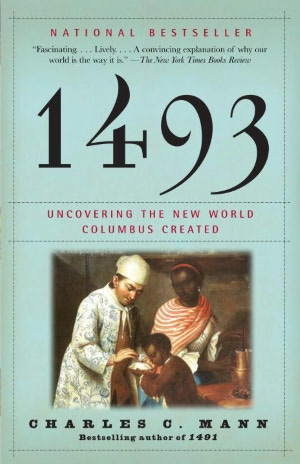In agricultural societies, the main factors of production are land and labor.
In Chapter 9 of 1493: Uncovering the New World Columbus Created, author Charles C. Mann makes the point that at the beginning of the slave trade:
- European aristocrats owned land and could relatively easily buy and sell land. There was increasing religious pressure against enslavement of Christians, and one must assume that relatively few Slav and Saracen slaves would have been available.
- In Africa, land was owned by kings, tribes or governments but not individuals. The powerful owned slaves and could relatively easily buy and sell them.
In both societies the rich and powerful were able to combine land and labor productively, and in both cases the rich and powerful were able to appropriate a significant portion of the value of production. They did so by very different means, and labor had very different connotations in the two societies.
Africans obtained slaves by raids into other countries, but slaves were sometimes freed after years of freedom, and ofttimes slaves had relatively comfortable lives. Indeed, according to Mann, the slaves were often from families or communities known to their (new) owners.
I find myself imagining the first meetings between Europeans buying slaves to resell into the American plantations and African slave owners. Neither could possibly have understood the cultural context of what the other thought he was doing. Moreover, neither could possibly have understood the horror that would eventually mark the process that they were initiating, in which many slaves died in the passage to the new world and only a small percentage would survive more than a few years of slavery.
The chapter is primarily about the resistance of slaves -- Africans and those of African ancestry, but also Indian -- to their slavery. It mentions the slave revolt in Haiti, but also the towns and even larger polities created by escaped slaves in Brazil, Mexico, Nicaragua and the United States. Mann points out that many of the men sold into slavery in Africa were soldiers who had been captured in wars between African nations. Not only were they willing to fight for their freedom, but they had been trained to do so and were experienced in war.
The legacy of slavery and of those who escaped slavery is still visible in many places. Mann points out that the Brazilians were very surprised in recent times to find the number of descendants of slaves and towns occupied entirely by those descendants that existed in the Amazon and other regions of Brazil. When traditional land holdings by these people were given legal standing, a huge area of the nation was affected -- something that had not been properly appreciated by the lawmakers.
The chapter is primarily about the resistance of slaves -- Africans and those of African ancestry, but also Indian -- to their slavery. It mentions the slave revolt in Haiti, but also the towns and even larger polities created by escaped slaves in Brazil, Mexico, Nicaragua and the United States. Mann points out that many of the men sold into slavery in Africa were soldiers who had been captured in wars between African nations. Not only were they willing to fight for their freedom, but they had been trained to do so and were experienced in war.
The legacy of slavery and of those who escaped slavery is still visible in many places. Mann points out that the Brazilians were very surprised in recent times to find the number of descendants of slaves and towns occupied entirely by those descendants that existed in the Amazon and other regions of Brazil. When traditional land holdings by these people were given legal standing, a huge area of the nation was affected -- something that had not been properly appreciated by the lawmakers.
- Humans are part of the Colombian Exchange.
- Rubber and how it went global.
- What Happened when the potato and its pests reached Europe
- What happened when American food crops got to China
- The Silver Trade after 1493
- The Little Ice Age Might Have Been Global Warming in Reverse
- The Globalization of Trade in Psychoactive Substances
- A Thought About Mosquito Borne Diseases

No comments:
Post a Comment